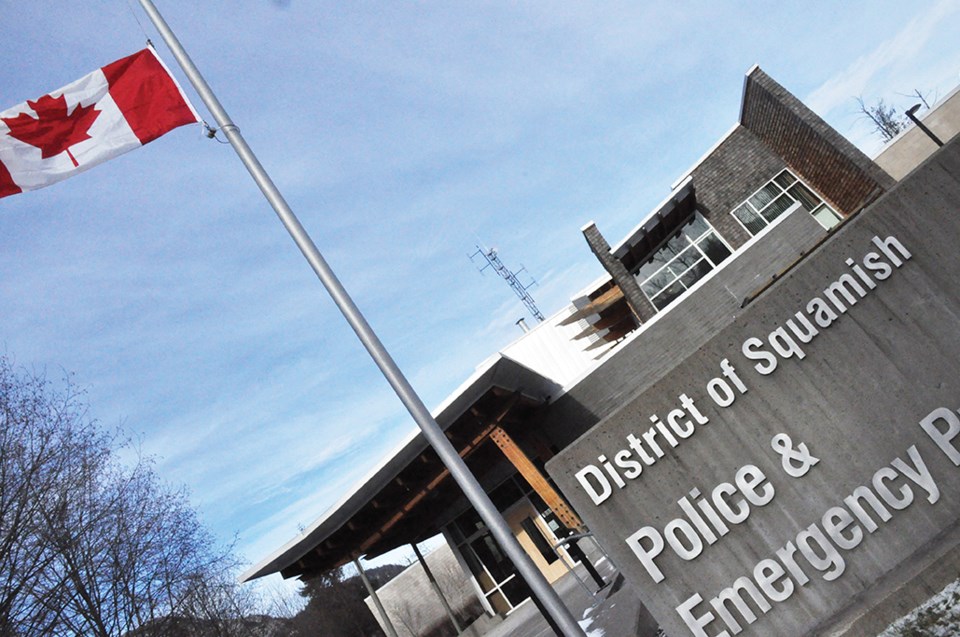Violent crime is down in Squamish, while property crime, crashes and mental health apprehensions are up.
These are some of the generalizations that were presented at the committee of the whole meeting on Tuesday by Inspector Kara Triance, Officer in Charge for the Sea to Sky RCMP detachment.
The presentation was made in order to get feedback from council members about what the Squamish RCMP should prioritize in the 2017/2018 year.
Areas of focus are issues local officers will prioritize when they are not out responding to calls, Triance explained.
After feedback at the committee, some highlights of likely priorities include an increased focus on sexual assaults and intimate partner violence; enhanced interaction with and service to at risk and vulnerable members of the community; and road safety, in particular along routes children travel to school.
Squamish’s unsolved homicides will also be in the spotlight in the coming year.
There are approximately 12 unresolved homicide cases in the district, some of which date back decades, according to Triance.
“We have simply not carved out the time to dedicate to these homicides,” she said. “I am confident if I set aside time for our police officers to work on these that they could further some of these investigations.”
Overall in 2016, local officers fielded a total 8,726 files, roughly the same number as in 2015, and 732 charges were laid in 2016, down about seven per cent from 2015.
Violent crime was down in 2016 with 471 files, about a nine per cent drop from 2015.
Squamish had 43 intimate partner violence files in 2016, 12 sexual assaults, nine robberies and 156 assaults.
By focusing on intimate partner and sexual assault cases, officers can enhance the positive work already done in the community, Triance said.
“So protecting women through better collaboration with our service providers,” she said.
Triance warned that the sexual assault and intimate violence stats for Squamish may go up with a focus on these issues because more reported cases can mean people trust the police enough to come forward.
In terms of offenses related to substance abuse, there were 16 cocaine possession files, 76 for cannabis and 136 intoxicated in public files in 2016.
Police focused less on enforcement around marijuana in 2016, Triance noted, with a 44 per cent drop in those files over 2015.
Triance said she sees drug related offenses fundamentally as social and health issues.
“I hate to call this an offense because I believe it is a social issue that we need to deal with in that manner,” she said.
Officers transported people suffering from mental health issues to the hospital 15 times in 2016, a 25 per cent increase over 2015.
“It is a key issue for policing and it is a key issue for our community right now,” she said of mental health issues in Squamish.
In terms of road safety, there were 431 crashes in 2016, up 15 per cent from 2015; two crashes were fatal and drivers logged 149 driving while impaired infractions in 2016. Impaired infractions were down 25 per cent over 2015.
Triance noted Squamish has a separate provincially funded integrated traffic safety unit for the Sea to Sky Highway between Lions Bay and Pemberton that prioritizes reducing traffic fatalities on the highway and that focus will continue.
Property crime was up slightly in the district in 2016 with 880 offenses, a seven per cent increase over 2015.
There were 75 residential break-and-enters, 178 theft from vehicles and 47 bike thefts.
Triance noted all the stats were presented as a guide for making a strategic plan and are not to draw firm conclusions from.
She will incorporate feedback from council members and return to a future committee meeting with a firm plan for the year and ways to measure success, she said.
Mayor Patricia Heintzman called Triance’s presentation of the Squamish RCMP’s current approach to crime in the district refreshing.
“Less a fire extinguisher approach to policing to more of a community based policing model where we are really learning and understanding and collaborating with the community to problem solve and make our community safer, so this has been a refreshing way of approaching policing,” she said.



